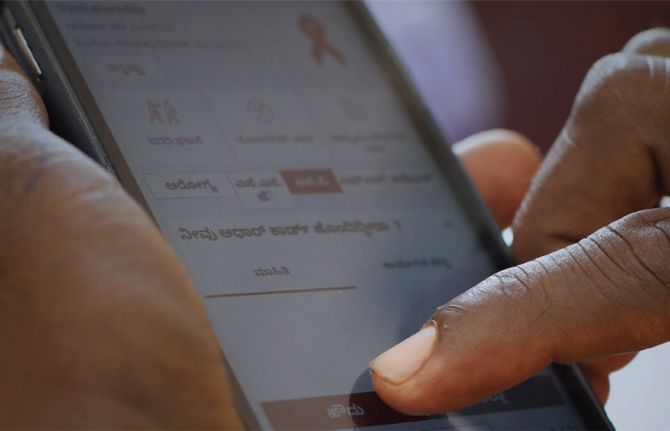

Feature Story
Mobile phones provide massive potential to move towards e-health systems
26 April 2018
26 April 2018 26 April 2018Shiv Kumar, from Swasti Health Catalyst in India, decided to build a mobile and web application called Taaras (rapid progress). He had watched peer educators work with sex workers in Bangalore, India, and realized that he could make their jobs a lot simpler and more efficient. The south-east Indian city has become a major hub and, as a result, the population has boomed, as have sex workers.
After seeing outreach workers, mostly former sex workers, lugging notebooks and jotting down information and recalling appointments and treatment pickups, he created an app that helps with data collection. “Icons and swipes allow outreach workers to enter all sorts of stuff and swipe and pick up where they left off,” Mr Kumar said. They can also text multiple recipients with reminders and invitations.
“Outreach can no longer be a one-way street. You have to engage the patient,” he said.
The app rolled out in five Indian states in English as well as four regional languages. Since its debut in March 2016, there are now more than 400 users following about 120 000 sex workers.
Bangalore outreach worker Natranity said that she has a lot less paperwork to deal with. “All the data of a particular person is now in one place, versus five or six registers that I had to consult,” she said. Her colleague, Abdul, agreed, “I see about 10 to 15 people a day and what saves me a lot of time is not asking the same questions over and over again, because I can consult their profile.”
The phones had their limits, they explained. “At the initial stage, it’s important to build trust to avoid any discomfort in case they think we are taking photos or recording them,” Natranity said.
Prachi Patel, a technology developer at Swasti, sees Taaras as a bridge to an overall solution. “The app is a helper; outreach workers still do all the talking,” she said. A by-product of the app has been higher engagement with sex workers and an increase in reporting incidents of violence. For confidentiality, the app has a stress password that scrambles the data in the event that someone tries to access the information.
UNAIDS Senior Adviser Philippe Lepère commends such efforts and believes e-health has a huge potential. Not only can it strengthen health systems, it also empowers people to manage their own care. Referring to the World Health Organization’s Guidelines on the use of antiretroviral drugs for treating and preventing HIV infection: recommendations for a public health approach, he said that they advocate using text messages to remind people to take their treatment and encourage newly diagnosed people to seek out services.
For this to work, however, he stressed the importance of confidentiality and respect of the user. “Receiving an HIV-related SMS can have drastic consequences in some communities,” he explained. That's why, he said, the content and the frequency have to be ironed out beforehand. “Most importantly, it’s urgent to shift from pilot studies to a larger implementation of programmes at a sufficient scale that can then be integrated within health systems,” Mr Lepère said.
“In certain countries, digital apps have flooded the market and the government has no way of accessing the data or doing any quality control,” he said.
Hani Eskandar, from the International Telecommunications Union, definitely sees mobile phones as paving the way towards universal health coverage.
But, in his view, e-health systems are far from a reality. “Countries have not yet grasped the benefits of this, because they are still focused on vaccines and building hospitals rather than outreach,” he said. He is pushing for governments to rebuild infrastructures that integrate digital platforms.
“It's simple,” he said. “We need for mentalities to change at all levels and stop thinking that the phone is just a gadget.”



